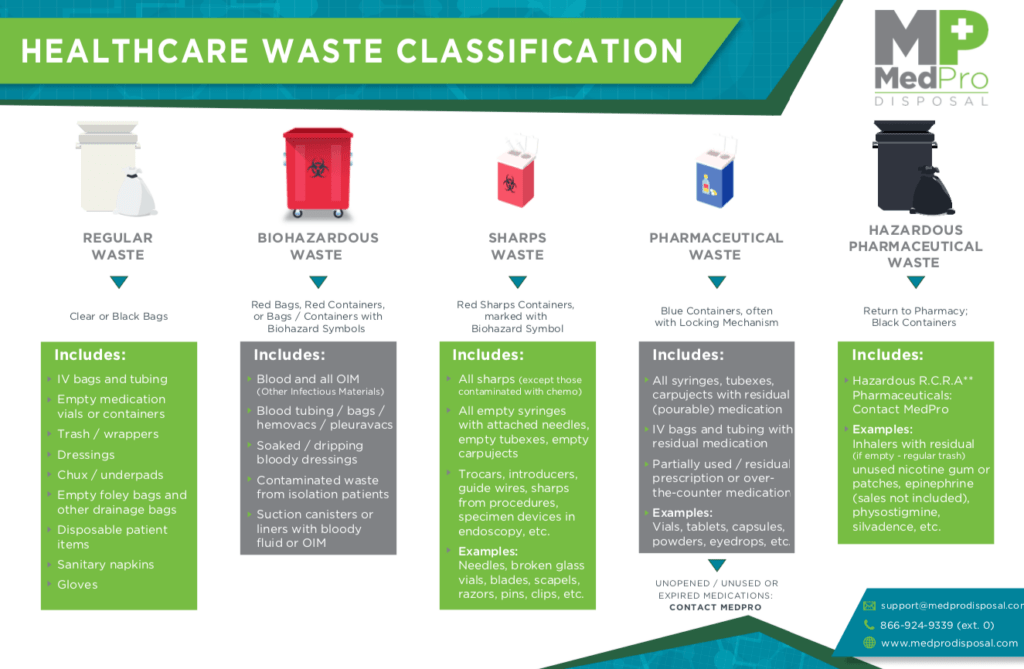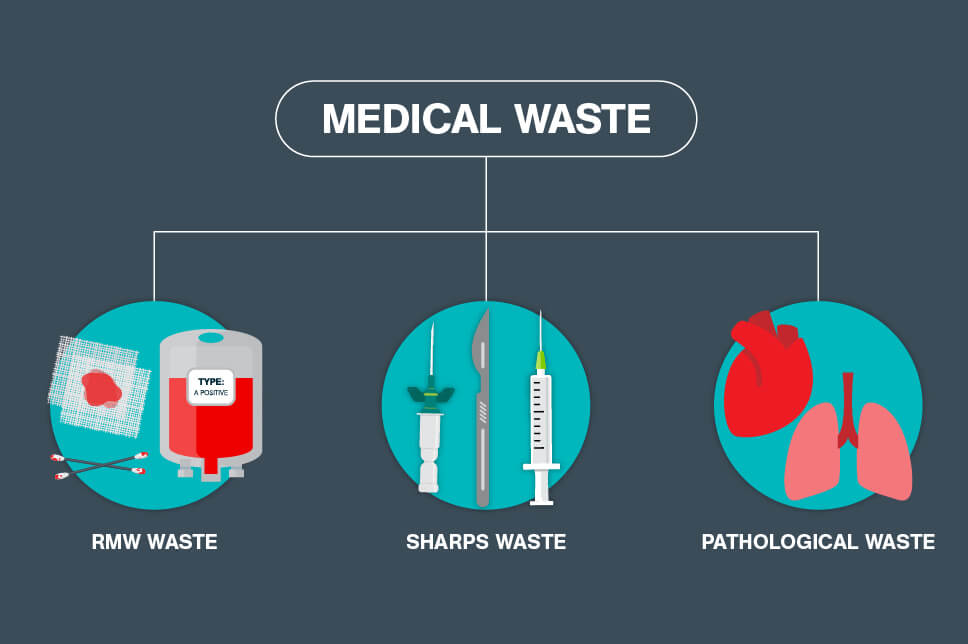Eco-Friendly Solutions for Medical Waste Removal: Prioritizing Safety And Security and Compliance
Wiki Article
Appropriate Disposal Methods for Medical Waste
Proper disposal methods for clinical waste are of utmost importance in guaranteeing the safety and security of both health care employees and the general public. The proper handling and disposal of medical waste is crucial to prevent the spread of contagious illness and the contamination of the atmosphere. This introduction will certainly explore the relevance of proper medical waste disposal, offer guidelines for managing different types of waste, and highlight the requirement for healthcare centers to take on best methods.Value of Appropriate Clinical Garbage Disposal
Correct clinical waste disposal is of utmost significance in order to prevent the spread of infections and protect public health. Clinical waste describes any kind of waste generated throughout clinical treatments or from the healthcare industry. This waste can have contagious materials, such as blood or physical liquids, sharps, pharmaceuticals, and other possibly dangerous compounds. If not dealt with effectively, clinical waste can posture serious dangers to healthcare employees, patients, and the basic public.Among the key factors for proper clinical garbage disposal is to stop the spread of infections. Medical waste can nurture numerous pathogens, consisting of bacteria, infections, and other microorganisms that can create illness. Incorrect disposal can cause the contamination of surfaces, water resources, and air, enhancing the risk of infections. By securely throwing away clinical waste, the possibilities of exposure to these pathogens are dramatically reduced, making certain the safety of medical care workers, clients, and the neighborhood at big.
Additionally, appropriate clinical waste disposal is vital for protecting public health and wellness. Clinical waste that is not properly managed can contaminate soil, water bodies, and also food resources. This can bring about the transmission of diseases to pets and people, posing a considerable public health danger (WasteX Medical Waste Disposal). By complying with appropriate disposal methods, such as therapy, partition, and control, we can reduce the possible risks associated with clinical waste and secure the wellness of the area.
Handling and Disposing of Sharps
When it involves the handling and disposal of sharps, adherence to appropriate protocols is essential for guaranteeing the safety and security of health care employees and stopping the threat of injury or infection. Sharps include needles, syringes, lancets, and various other things with the prospective to penetrate or reduce the skin. Due to their possible to send bloodborne pathogens, such as HIV and liver disease B and C, it is essential to deal with and dispose of sharps correctly.
Disposal of sharps containers must adhere to local policies and standards. It is best to use qualified clinical waste disposal solutions that specialize in the proper handling and disposal of sharps to ensure compliance with guidelines and decrease threats to medical care workers and the atmosphere.
Standards for Contagious Waste Disposal
Health care centers have to abide by rigorous guidelines for the disposal of infectious waste to stop the spread of pathogens and safeguard public health. Contagious waste, likewise called biomedical or biohazardous waste, describes products that are possibly polluted with transmittable representatives or other hazardous materials. These materials consist of blood-soaked plasters, used samplings, cultures, and handwear covers. Appropriate disposal of contagious waste is important to guarantee the security and well-being of health care workers, individuals, and the public.The guidelines for transmittable garbage disposal vary depending upon the country and local regulations, however there are some usual techniques that health care centers should adhere to. All transmittable waste needs to be set apart from various other types of waste at the factor of generation. This aids stop cross-contamination and makes sure that the waste can be handled suitably. Transmittable waste needs to be saved in leak-proof, puncture-resistant containers that are plainly identified with the biohazard sign. When not in use to minimize the danger of exposure, these containers ought to be kept shut. Infectious waste should be delivered and disposed of by qualified waste monitoring firms that specialize in taking care of biomedical waste.
It is crucial for healthcare facilities to have thorough training programs in position to inform team on the appropriate procedures for transmittable garbage disposal. This includes training on waste partition, storage space, and taking care of techniques. By adhering to these standards, healthcare facilities can properly manage infectious waste, decrease the risk of infections, and protect public health.
Finest Practices for Drug Waste Disposal
Pharmaceutical garbage disposal must constantly be carried out consistently and based on professional standards. Correct monitoring of pharmaceutical waste is important to protect public health and the setting. Pharmaceuticals can position a significant threat otherwise disposed of correctly, as they may pollute water sources, harm water life, or even add to the development of antibiotic resistance.One of the most effective practices for pharmaceutical garbage disposal is to establish a marked collection system within health care centers. medical waste disposal service. This system needs to include different containers for different kinds of pharmaceutical waste, such as expired drugs, extra medications, and infected materials. These containers ought to be plainly classified and situated in conveniently obtainable areas to urge appropriate disposal by health care specialists
Moreover, it is critical to educate health care staff regarding the correct handling and disposal of pharmaceutical waste. Training programs must focus on identifying different sorts of pharmaceutical waste, recognizing the associated threats, and following the suitable disposal procedures. Normal pointers and updates should be offered to ensure compliance with disposal guidelines.
Along with internal techniques, medical care centers should likewise establish partnerships with certified waste administration firms. These firms focus on the collection, transportation, and disposal of pharmaceutical waste. By working with these experts, medical care facilities can guarantee that their pharmaceutical waste is gotten rid of safely and in compliance with regional regulations.
Compliance With Legal Regulations
In order to ensure conformity with lawful guidelines, it is essential for healthcare centers to comply with proper disposal strategies for medical waste. Medical waste positions a significant danger to public wellness and the atmosphere, making it vital for healthcare facilities to get rid of and manage of it in accordance with the legislation.
Governing bodies, such as the Occupational Safety And Security and Health Management (OSHA) and the Epa (EPA), have developed standards and needs for the correct disposal of medical waste - WasteX Medical Waste Disposal. These policies intend to shield health care workers, waste administration personnel, and the basic public from potential risks related to clinical waste

Non-compliance with legal policies can cause extreme consequences for healthcare facilities, including fines, lawful obligations, damages to credibility, and prospective damage to public health. For that reason, it is vital for medical care facilities to remain current with the most recent policies and continuously display and improve their waste management practices.
Verdict
Sticking to standards for taking care of and disposing of sharps, infectious waste, and pharmaceutical waste is vital. It is essential that healthcare facilities keep stringent protocols for the appropriate disposal of medical waste to decrease threats and maintain a secure health care atmosphere.Clinical waste refers to any kind of waste generated throughout medical procedures or from the medical care sector. Transmittable waste, also recognized as biomedical or read what he said biohazardous waste, refers to products that are possibly infected with infectious representatives or various other unsafe substances. All infectious waste ought to be segregated from other types of waste at the factor of generation. Transmittable waste ought to be moved and disposed of by licensed waste management business that specialize in taking care of biomedical waste.
Adhering to standards for managing and disposing of sharps, contagious waste, and pharmaceutical waste is essential. (medical waste removal)
Report this wiki page